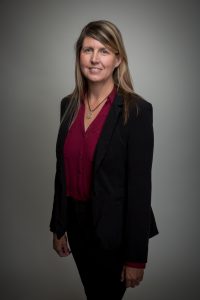Janet D. Stemwedel, a professor and chair of the Department of Philosophy in the College of Humanities and the Arts has been elected to the rank of Fellow by the American Association for the Advancement of Science (AAAS). She is one of 396 AAAS members across disciplines to be awarded the distinction in 2017 and was recognized in the section on History and Philosophy of Science. Each year the Council of the AAAS elects members whose “efforts on behalf of the advancement of science or its applications are scientifically or socially distinguished.”
She joins an elite group of Fellows in a tradition that dates back to 1874. Among past Fellows are Maria Mitchell, who discovered a comet that now carries her name; inventor Thomas Edison; anthropologist Margaret Mead, and biologist James Watson. Earlier this year, five AAAS Fellows were named as 2017 Nobel laureates.
Stemwedel, who holds doctorate degrees in both chemistry and philosophy, was recognized for distinguished contributions to the philosophy of science and ethics, and for exceptional efforts to promote the public understanding of science and scientists in culture.
“It’s hard to imagine engaging in the work for which I’m being honored any place else but San José State,” Stemwedel noted. “I’ve been blessed here with colleagues and an academic environment that has fully supported both my interdisciplinary work and non-traditional activities like blogging, podcasts, and tweeting that bring my scholarship out of the ‘ivory tower’ and into contact with the wider world. As a philosopher who helps the public to understand scientists and scientists to understand the public, I’m working to build a future that’s more humane for everyone. I’m delighted to share this recognition with San José State.”
She shared some of her research in a 2016 University Scholars Series lecture in which she discussed the ethical dimensions of being a good scientist that extend beyond avoiding or responding to scientific misconduct.
“Scientific knowledge is the result of particular kinds of interactions between human scientists who are also interacting with the piece of the world they’re studying,” she said. “Once you have an activity that requires humans to interact with each other, ethics has to be part of the story.”
Stemwedel contributes to Forbes.com and has maintained blogs where she is able to engage with an audience of working scientists and students from different disciplines and countries who are at various stages of their careers.
“They tell me if they think I’m missing an important feature of their scientific interactions, or if they find my ethical prescriptions implausible,” she said. “My audience also brings new questions to my attention, whether they’re from breaking news stories or from issues they’re trying to work out in their own lives as scientists.”
The ultimate goal of her research is to find ways to help scientists do their jobs better and to successfully share their findings with nonscientists.
“There are lots of ways to use philosophical tools – like logic and conceptual analysis – to develop strategies to address challenges in the real world, and lots of different challenges for which having a philosopher – or a college graduate with a philosophy degree – on your team might make a difference,” she said.
